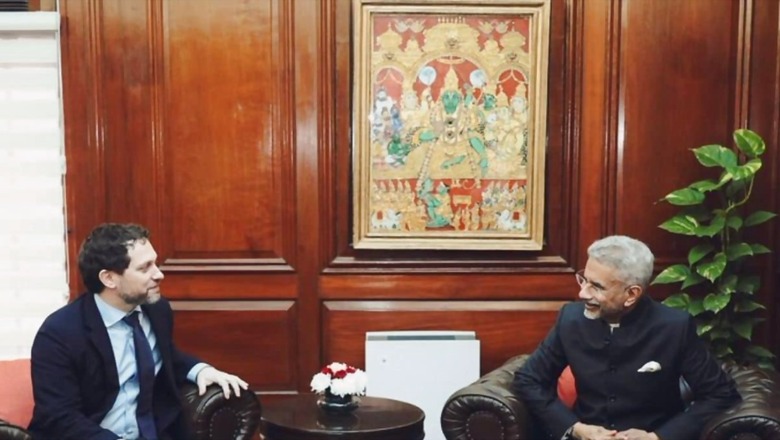
views
The US’ Principal Deputy NSA Jonathan Finer on Monday separately met External Affairs Minister S Jaishankar and NSA Ajit Doval with a focus on shoring up bilateral ties, in the first publicly announced engagement between the two sides after Washington alleged an Indian link to a foiled plot to kill a Sikh separatist on its soil.
Finer, currently on a visit to New Delhi, and his Indian counterpart Vikran Misri undertook the first comprehensive mid-term review of the India-US Initiative on Critical and Emerging Technologies (iCET) during wide-ranging talks.
In May last year, Prime Minister Narendra Modi and President Joe Biden launched the iCET to facilitate outcome-oriented cooperation between the two nations in new and emerging technologies.
“During the consultations, the two Deputy NSAs reviewed key bilateral issues and exchanged views on regional and global developments,” the Ministry of External Affairs (MEA) said.
The senior White House official’s visit came days after American prosecutors linked an Indian official to a man charged with conspiring to assassinate Sikh separatist Gurpatwant Singh Pannun.
The MEA said Finer called on NSA Doval and External Affairs Minister Jaishankar and that he will meet Foreign Secretary Vinay Kwatra.
It is understood that the issue figured in Finer’s meetings with the Indian officials, but there is no official confirmation on it.
“Good to meet Principal Deputy NSA of the US Jon Finer this afternoon. Useful exchange of views on the global situation. Discussed taking our bilateral cooperation forward,” Jaishankar said on X.
Good to meet Principal Deputy NSA of the US Jon Finer this afternoon.Useful exchange of views on the global situation. Discussed taking our bilateral cooperation forward. pic.twitter.com/WBwVCPpzF5
— Dr. S. Jaishankar (@DrSJaishankar) December 4, 2023
India on Thursday had described as a “matter of concern” the US linking the Indian official to a man charged with conspiring to kill Pannun, and asserted that follow-up action will be taken based on findings of a panel investigating the allegations.
India has already constituted a team to investigate the allegations relating to the foiled plot.
On Wednesday, US federal prosecutors charged Nikhil Gupta, 52, of working with an Indian government employee in the foiled plot to kill Pannun.
US prosecutors informed a Manhattan court that authorities in the Czech Republic arrested and detained Gupta. Pannun, a leader of the so-called ‘Sikhs for Justice’, is wanted by Indian probe agencies on various terror charges.
The Financial Times, citing unnamed sources, first reported last month that US authorities foiled a plot to assassinate Pannun, and issued a warning to the Indian government over concerns it was involved in the plot.
The Washington Post on Wednesday had said that the Biden administration was so concerned after discovering the plot that it sent CIA Director William J Burns and Director of National Intelligence Avril Haines to India in August and October, respectively, to demand investigation and hold those responsible to account.
Last week, US Secretary of State Antony Blinken welcomed as “good and appropriate” India’s decision to announce a high-level probe into the allegations.
On Finer’s talks with Misri, the MEA said the two Deputy NSAs undertook the first comprehensive mid-term review of the iCET after the first meeting led by the respective NSAs in January this year in Washington.
The iCET is co-led by the National Security Council Secretariat in India and the US National Security Council.
The MEA said Misri and Finer took stock of progress made in building technology value chains under the framework of the iCET.
“They expressed satisfaction with ongoing collaborations in diverse domains, including semiconductors, quantum, artificial intelligence and high-performance computing, defence innovation, space, and advanced telecommunications, through interactions between the respective governments, industry, academia and other stakeholders,” it said in a statement.
It said the two Deputy NSAs also reiterated their commitment to fulfilling the vision of Modi and Biden for elevating the bilateral strategic partnership and agreed to broaden the scope of iCET to biotechnology, critical minerals and rare earths processing technologies, digital connectivity and digital public infrastructure, and advanced materials.
“They also affirmed the importance of easing regulations to facilitate high-tech collaborations, and transfer of technology. Their discussions served to highlight the immense potential to tap synergies between their domestic initiatives and boost the competitiveness of industry in both countries,” the MEA said.

















Comments
0 comment